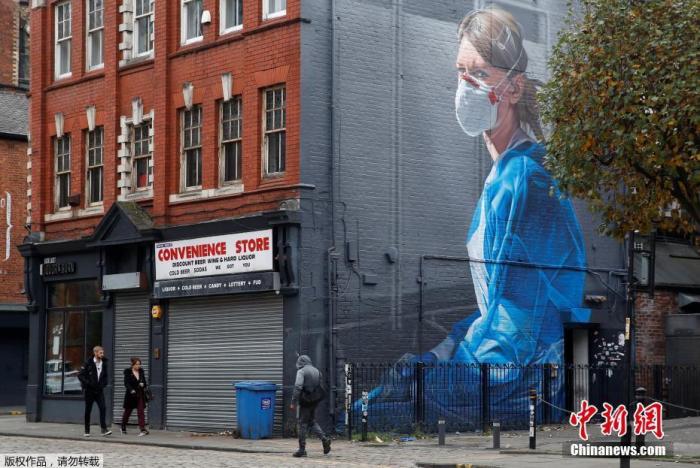The British Parliament voted on the 4th to pass Prime Minister Boris Johnson’s previously announced proposal for England to "close the city" for one month from the 5th.
Johnson emphasized that the new round of "closures" will not be postponed.
The new crown epidemic in the UK is still serious, with nearly 500 new deaths on the 4th.
Officials from the government vaccine procurement department said that the original September "receipt" plan has been postponed to the end of the year, and the number of vaccines will be much lower than expected.
On October 19, local time, in Manchester, England, a mural tribute to frontline medical workers in the fight against the epidemic appeared on the street.
【"No Adventure"】
Johnson's proposal to "close the city" in England won an "overwhelming victory" in Parliament, with 516 members in favor and 38 against.
However, members of the Conservative Party led by Johnson included members who voted against it.
The new epidemic prevention measures will take effect from the 5th in accordance with the provisions of the proposal.
Johnson emphasized in the parliament that the new round of "closures" will "automatically terminate" four weeks later, that is, on December 2. "I very much hope that at that time we can see this country continue to move forward, commercial activities continue, and stores reopen. Open, get ready for Christmas".
According to multiple media reports, Johnson emphasized that the "closure" will not be postponed, and is intended to appease his party and opposition members who are worried that the new round of "closure" will seriously impact the economy and people's livelihood.
The British government previously implemented a three-level zoning epidemic prevention policy in England, and the third level corresponds to the strictest epidemic prevention measures.
Scotland, Wales and Northern Ireland each formulated their own epidemic prevention measures.
England’s "closure" is more stringent than the third-level prevention and control measures: from the 5th, people are prohibited from going out except for special reasons such as going to school, going to work, exercising, buying daily necessities and medicines; bars, restaurants, etc., will stop eating. Only take-aways are allowed; non-essential retail businesses are closed; exits are not encouraged; organized amateur sports activities for adults and children are prohibited.
Johnson said in Parliament that seeing the impact of the epidemic in other European countries on medical staff and the public, he is "not prepared to risk the lives of the British people."
【"Waiting for Vaccine"】
The confirmed cases and deaths of the new crown in the UK continue to hover at a high level.
On the 4th, the British Ministry of Health data showed that there were 1099059 confirmed cases of new crowns nationwide, 25,177 new cases in a single day; 47,742 deaths and 492 new cases in a single day.
Many media reported that the number of new deaths in a single day on the 4th was the highest since mid-May.
Kate Bingham, an official in charge of the vaccine procurement project of the British government, said on the 4th that the British pharmaceutical company AstraZeneca originally scheduled to deliver about 30 million doses of vaccine to the government in September this year, but it has been delayed. The "best case" may be the end of this year. Approximately 4 million doses of vaccine were delivered.
According to the purchase agreement reached in May, AstraZeneca should deliver a total of 100 million doses of vaccine to the British government, of which about 30 million doses will be delivered by September this year.
This vaccine was developed in collaboration with AstraZeneca and Oxford University.
The University of Oxford said earlier that vaccine production has begun, and it believes that the effectiveness of the vaccine will be confirmed in the final clinical trials at the end of the year.
Bingham told reporters that although it takes time to expand vaccine production, the current production speed is "unprecedented" and all 100 million doses of vaccine may be delivered in the "first half of next year".
AstraZeneca said in a statement that once it is approved by the regulatory authorities, it can "swiftly supply hundreds of millions of doses of vaccine."
There was a problem with this vaccine project. One subject experienced an adverse reaction after being vaccinated in early September, and then all global clinical trials were suspended.
In mid-September, Oxford University and AstraZeneca said that after investigation, the safety of the vaccine was recognized by the British Independent Investigation Commission and regulatory agencies.
Clinical trials in many countries, including the United Kingdom, have subsequently resumed.
(Zheng Haoning) (Xinhua News Agency special feature)

